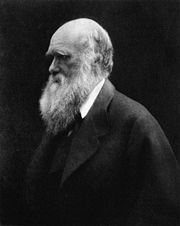
Evolutionary ecology
Encyclopedia

Ecology
Ecology is the scientific study of the relations that living organisms have with respect to each other and their natural environment. Variables of interest to ecologists include the composition, distribution, amount , number, and changing states of organisms within and among ecosystems...
and evolutionary biology. It approaches the study of ecology in a way that explicitly considers the evolutionary histories of species and the interactions between them. Conversely, it can be seen as an approach to the study of evolution that incorporates an understanding of the interactions between the species under consideration. The main subfields of evolutionary ecology are life history evolution
Life history theory
Life history theory posits that the schedule and duration of key events in an organism's lifetime are shaped by natural selection to produce the largest possible number of surviving offspring...
, sociobiology
Sociobiology
Sociobiology is a field of scientific study which is based on the assumption that social behavior has resulted from evolution and attempts to explain and examine social behavior within that context. Often considered a branch of biology and sociology, it also draws from ethology, anthropology,...
(the evolution
Evolution
Evolution is any change across successive generations in the heritable characteristics of biological populations. Evolutionary processes give rise to diversity at every level of biological organisation, including species, individual organisms and molecules such as DNA and proteins.Life on Earth...
of behavior
Behavior
Behavior or behaviour refers to the actions and mannerisms made by organisms, systems, or artificial entities in conjunction with its environment, which includes the other systems or organisms around as well as the physical environment...
), the evolution of interspecific relations (cooperation
Cooperation
Cooperation or co-operation is the process of working or acting together. In its simplest form it involves things working in harmony, side by side, while in its more complicated forms, it can involve something as complex as the inner workings of a human being or even the social patterns of a...
, predator-prey interactions, parasitism
Parasitism
Parasitism is a type of symbiotic relationship between organisms of different species where one organism, the parasite, benefits at the expense of the other, the host. Traditionally parasite referred to organisms with lifestages that needed more than one host . These are now called macroparasites...
, mutualism) and the evolution of biodiversity
Biodiversity
Biodiversity is the degree of variation of life forms within a given ecosystem, biome, or an entire planet. Biodiversity is a measure of the health of ecosystems. Biodiversity is in part a function of climate. In terrestrial habitats, tropical regions are typically rich whereas polar regions...
and of communities
Community
The term community has two distinct meanings:*a group of interacting people, possibly living in close proximity, and often refers to a group that shares some common values, and is attributed with social cohesion within a shared geographical location, generally in social units larger than a household...
.
Evolutionary ecologists

- Charles DarwinCharles DarwinCharles Robert Darwin FRS was an English naturalist. He established that all species of life have descended over time from common ancestry, and proposed the scientific theory that this branching pattern of evolution resulted from a process that he called natural selection.He published his theory...
- George Evelyn Hutchinson
- Robert MacArthurRobert MacArthurRobert Helmer MacArthur was an American ecologist who made a major impact on many areas of community and population ecology....
- Eric PiankaEric PiankaEric Rodger Pianka is an American biologist, whose work includes herpetology and evolutionary ecology. His textbook, Evolutionary Ecology is considered a classic, and his writings for the general public and television appearances have made him an influential figure.-Youth:Pianka was born in...
- Michael RosenzweigMichael RosenzweigMichael L. Rosenzweig is an ecologist at the University of Arizona who has developed and popularized the concept of Reconciliation ecology. He founded and developed the Department of Ecology and Evolutionary Biology, at UA Tucson, now a major center for the study of Evolutionary Ecology...
External links
- Evolutionary Ecology Research - a journal in the field.
- Methods in Ecology and Evolution - a journal the field.
- Main issues of Evolutionary Ecology

